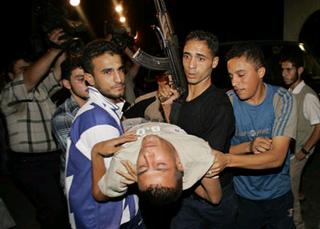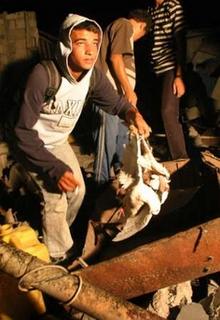Friday, September 30, 2005
"A Great Shame'
Ghassan Khatib, now the Interior Minister of the PA, was its one time editor. He was succeeded by Joharah Baker.
Some reflections from Palestine Report's journalists.
"The report has been part of my personal journey as well. In the eight years at Palestine Report, I married and had two children. Palestine Report has been my forum for telling our story – how we struggled to obtain birth certificates for our children from the Israeli interior ministry, how we are separated at Israel’s border crossings when traveling abroad and how life as a Palestinian West Banker in Jerusalem has sometimes become almost unbearable." Joharah Baker
I remember this story by Joharah and the specific details she conveyed regarding the bureaucratic nightmare that involved getting up in the wee hours of the morning, then standing in line for hours only to be turned away time and time again by an unconcerned government official because the person wanting the birth certificate was Palestinian. The stress is compounded because the certificate must be attained within a certain time period or the child would not be allowed to legally reside in Jerusalem.
I concur with Omar Karmi that it is "a great shame" that this publication can not stay afloat.
"The Palestine Report, under-funded, understaffed and overworked as it has been simply trying to keep up with the violence of the past few years, nevertheless always tried to present those stories that got lost amid the bombs and bulldozers. There was the 19-year-old athlete from Deir Al Balah whose talent and persistence took her from Gaza to Athens where she joyously bore the Palestinian flag at the 2004 Olympics opening ceremony and competed in the 800 meter race. There was the bravery of farmers in the West Bank, who would risk their lives to reap their olive harvests. There was the sheer pigheadedness of refugees in Rafah, forced to flee their houses in 1948, then again in 1971 and then in 2004, still building, teeth grinding, their fourth dwellings.
"It is a great shame that not more effort is exerted by the international community to encourage professionalism in the media and too much focus is devoted to outlandish joint media projects that often serve no other purpose than to provide slush funds for some individuals and ease the vaguely guilty liberal consciences of others. It is a great shame too that the value of serious and credible journalism, independent of any cause or agenda, is not appreciated either by the international community of Palestinian philanthropists, who unlike their Jewish counterparts that keep afloat publications like the Jerusalem Report, find no similar focus for their charity on the Palestinian side."
"It is hard for me to say goodbye to the Palestine Report at a time when the Palestinians are in desperate need of arming themselves with tools, language and skills to tell their story to the world. This is what was said during an international symposium on the Palestinian media this month. It is clear that those in charge of the symposium and the presidency have not heard of this unique media outlet, to which we are forced to bid farewell. It seems they are uninterested in the fact that closing down Palestine Report means closing a very contemporary media window." Atef Saad
Thursday, September 29, 2005
Must Listen! Abunimah Interview -- Israeli Gov't: 'Everyday Israelis Have to Kill, and Kill, and Kill!"
Flashpoints.net: What's behind Israel's savage bombardment of Gaza?Interviewer: Dennis Bernstein, Flashpoints.net, 29 September 2005http://electronicintifada.net/v2/article4213.shtmlListen to an interview with EI cofounder Ali Abunimah on Flashpoints, 94.1FM, Berkeley, California. Dennis Bernstein interviewed EI's Ali Abunimah about Israel's savage campaign of air raids and bombardment of the occupied Gaza Strip following the pullout of Israeli settlers. Abunimah presents evidence that the Israelis provoked the violence deliberately and how it is part of a premeditated plan to terrorize the civilian population into submission.Download MP3: http://electronicIntifada.net/downloads/audio/20050928flashpoints.mp3
The Irgun and Transjordan
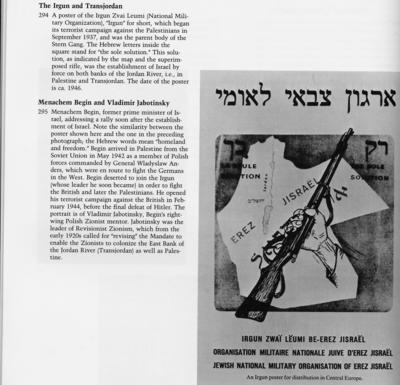
A poster of the Irgun Leumi (National Military Oranization), "Irgun" for short, which began its terrorist campaign against the Palestinians in September 1937, and was the parent body of the Stern Gang. The Hebrew letters inside the square stand for "the sole solution." This solution, as indicated by the map and superimposed rifle, was the establishment of Israel by force on both banks of the Jordan River, i.e., in Palestine and Transjordan. The date of the poster is ca 1946.
Khalidi, Walid. Before Their Diaspora: A Photographic History of the Palestinians, 1876-1948. Institute for Palestine Studies: Washington DC, 1991.
On the next page is a picture of Menachem Begin speaking after the partition of Palestine. Covering the podium is a similar picture. I noticed Ariel Sharon at a Likud gathering in which a large picture of Menachem Begin was displayed.
IOF Uses Brother of Murdered Victim As Human Shield
According to preliminary investigations conducted by PCHR, at approximately 00:30 on Thursday, 29 September 2005, IOF moved into Bourqin village, west of Jenin. They surrounded a number of greenhouses located to the west of al-Shuhada Street, a branch road of Jenin – Nablus road. They turned off the lights of their vehicles. Soon, sounds of explosions and intense gunfire were heard in the area. An hour later, IOF turned on the lights of their vehicles and moved towards Yahia Saber al-Shalabi's house. They forced the owner's son, 30-year-old Saher, out and took him to the place of the incident, which is 500 meters to the south of the house. They used him as a human shield to search a greenhouse belonging to his family. At approximately 05:20, IOF withdrew from the area and arrested Saher. Soon, a Palestinian ambulance moved towards the area of the greenhouses. The medical crew found two bodies in the area. The two bodies were transferred to Dr. Khalil Suleiman Hospital in Jenin. The victims were identified as:
1. Nidal Mohammed Ibrahim Khallouf, 32, hit by several live bullets to the head and the chest; and
2. Samer Yahia Saber al-Shalabi, 24, hit by several live bullets to the head, the chest and the left hand.
At approximately 07:00, IOF released Saher, who stated that IOF used him as a human shield to discover the destiny of the persons who were inside the greenhouse. One of the victims was his brother.
In another incident, at approximately 02:00, IOF moved into al-Saibat neighborhood in the old town of Jenin. A number of Palestinian gunmen clashed with IOF. One of the gunmen was killed during these clashes, Samer Ahmed al-Sa'di, 30, from Jenin refugee camp, who was hit by several live bullets to the head and the chest.
PCHR strongly condemns this serious escalation in attacks by IOF, which proves that IOF continue to substantially occupy the Gaza Strip, despite the recent evacuation of Israeli settlements in the Gaza Strip and the northern West Bank. PCHR is gravely concerned that a green light given to IOF by the Israeli government, allowing them to launch wide scale attacks, including extra-judicial killings and incursions in the Gaza Strip and the West Bank, will result in more casualties among Palestinian civilians. PCHR also warns that the campaigns of arrests waged by IOF in the West Bank constitute an intervention into the coming Palestinian elections. Consequently, PCHR calls upon the international community and the High Contracting Parties to the Fourth Geneva Convention of 1949 to immediately intervene to stop further deterioration and to protect Palestinian civilians from military operations conducted by IOF in the Occupied Palestinian Territory.
All in a Week's Work:IOF Kills 8, Raids Houses, Arrests 311
8 Palestinian civilians were killed by IOF. [Does not include three victims today in Jenin]
4 of the victims were extra-judicially executed by IOF in the Gaza Strip.
35 Palestinian civilians were wounded by IOF.
IOF launched 27 aerial attacks on civilian targets in the Gaza Strip, and launched dozens of mock aerial raids that terrified Palestinian civilians and damaged their property.
IOF conducted 91 incursions into Palestinian communities in the West Bank.
Houses were raided and 311 Palestinian civilians were arrested by IOF, including three human rights defenders: Nazeeh Sa'id Abu 'Oun, 43, Director of the Prisoners' Support Society in Jenin, Khalil 'Ali Abu 'Amru, 35, Director of the Prionsers' Support Society in Ramallah and Samer al-Nemer, 42, Coordinator of the Qatari Red Crescent in the West Bank.
A Palestinian house in Qabatya village near Jenin was destroyed by IOF in the context of collective punishment measures.
Offices of two charitable societies in Jerusalem and a number of others in the West Bank were closed by IOF.
IOF have continued to impose a total siege on the OPT; an old Palestinian man died as IOF obstructed his evacuation to the hospital; IOF have continued to close Rafah International Crossing Point and Beit Hanoun (Erez) crossing; and IOF arrested 15 Palestinian civilians at military checkpoints in the West Bank.
IOF have continued to construct the Annexation Wall in the West Bank; 9 international solidarity activists and a Palestinian civilian were arrested by IOF; and a Palestinian civilian was wounded by IOF near the Wall.
Dr. Sarraj Reports Further From Gaza
Dr. Eyad El-Sarraj is with the Gaza Community Mental Health Center
Gaza is in a state of panic, children are restless, crying, frightened and many are wetting their beds.
Some children are afraid leaving home and they refuse to go to school. Many are dazed, pale, insomniac and have poor appetite.
Some pregnant women reported colics and some were admitted to hospital with precipitated labour. Many people complain of ear pressure. All are stunned The new method of exploding sonic bombs in our skies was obviously never used before the disengagement so as not to alarm or hurt the Israeli settlers and their children.
Israel is inducing learned helplessness to the Palestinians in Gaza with the aim of making the whole population captive to fear and paralysis. This is a war crime and this is a racist crime. Israel must be stopped.
Dr. Eyad El Sarraj
Wednesday, September 28, 2005
Nightmares, Panic "Rain" in Occupied Palestine
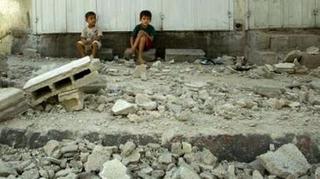
Deir Al Belah resident Ismail Abu Aziz says his five year old son Mohammad wets his bed every night, unable to control his bladder because he is so afraid. He, like many children in the Gaza Strip, is waking up from nightmares panicked from the sound explosions. Read story.
Sources in one of the sports clubs said it is not the first time that occupation forces have broken into their centers. It was reported that panic spread through the city as Israeli soldiers ran through the Rayada neighborhood, opening fire. Read story.
Israeli PM Sharon's directive to attack the Hamas party after saying he would stop the Palestinian Legislative Council elections if the party participated, has stretched well beyond Hamas. Israeli Apache helicopters fired missiles into the offices of the Fateh political party and the leftist PFLP party in Gaza City this morning. Read story.
In school, Zaqut says some children can't concentrate, listening nervously, anxious whether another boom is in the offing. Read story.
Pictures from Rafah before disengagement.
Letter from Gaza
Dear Friends,
In the last days, Gaza was awakened from its dreams with horrible
explosions which have shattered our skies, shaken our buildings, broken
our windows, and installed feelings of panic.
We suddenly felt helpless, under the control of the Israelis and at
their mercy. The new method of exploding sound bombs in our skies is now
available to the Israeli army who would not use it before the
disengagement because they were careful not to alarm or hurt the Israeli settlers who
were in Gaza. This new method was used by the Israeli army since Friday day and
night. Usually between 2-4 in the morning, between 6:30 ? 8 in the morning
school going time, and in the afternoon or early evening. The explosions are
heard and felt all over the Gaza Strip with the same intensity. These
explosions were used alongside the usual routine of bombing and killing which the
Israelis forces are familiar with.
This new cycle of terrific violence started with Israel assassinating
four people in the West Bank town of Tolkarem. In the same day Islamic Jihad
retaliated from Gaza by sending rockets to Israeli village of Sdirot.
In the same day 19 people were killed during a military parade of Hamas.
Apparently the cause was mishandling of explosive, but Hamas blamed
Israel. Hamas joined Islamic Jihad by sending rockets to Sdirot where five
people were injured.
Hamas quickly retracted and announced that it will stop all military
operation from Gaza. Islamic Jihad followed with assertion that it will
abide by the truce. Israeli campaign of bombing continues. Last night
I, with all Gazans, were awakened by the horrible noise twice, 3:30am and
at 7:15am. I hardly was able to sleep in between. I was supposed to travel
today to Amman and from there to Zurich to be with you, but Gaza is
also sealed off by the Israeli forces. No one is allowed in or out of Gaza
and that includes foreigners and even the Palestinian President Mr. Abbass
who appealed for calm. We stand firm against all forms of violence and in any name be it
national liberation or security.
We believe the whole area and perhaps the world is being attacked and
manipulated by a small group of fanatics on all sides. These violent
fanatics, some ideologue, some political and some business, are
supporting each other, feeding each other, and needing each other. The ultimate
victim is the ordinary human being, security, peace, and humanity itself.
We believe firmly that forces of evil should and can be stopped. Only
when people of wisdom, people of commitment to peace and equality in
humanity, to justice and to love, only when people stand together that good will
prevail and this is why we formed the FFIPPI* to struggle in solidarity
for justice and for peace, to end the military occupation, and to stop all
forms of violence.
We are committed to these ideals. And we want you to be with us.
Best regards,
Eyad El Sarraj
FFIPP HOME PAGE : http://www.ffipp.org
'The Children are Frightened. No One Can Sleep'
rafahnotes has updated with two excellent posts: one a reflection from the blog's author, and the other, latest developments from Rafah from Mohammed Omar.
Tuesday, September 27, 2005
'We Fully Understand Israel's Right to Defend Itself': White House
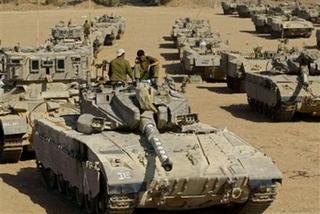
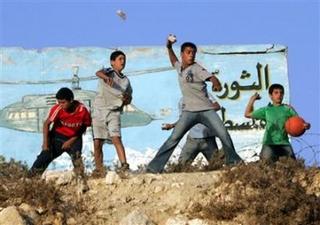
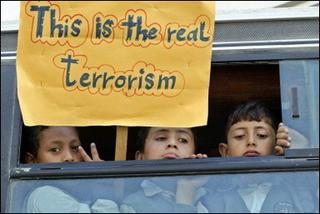
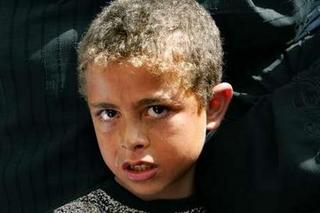
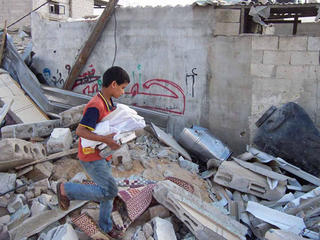
"We understand the situation in which Israel finds itself,"McCormack said. "And we fully understand Israel's right to defend itself."
White House Spokesman Sean McCormack
September 25, 2005
"Detentions targeted scores of Palestinian civilians, including religious figures, politicians, community leaders, academics, journalists, student activists, and nominees for the third round of municipal elections, scheduled for Thursday 29 September 2005 in the West Bank. PCHR’s fieldworkers in the West Bank reported that most of the detainees are considered Islamists, especially those close to the Islamic Resistance Movement (Hamas). Among the detainees were Sheikh Hasan Yousef, the Hamas spokesman in the West Bank, and Dr. Mohammad Ghazal, a Hamas political leader.
"Since 24 September 2005, IOF have carried out 18 aerial bombardment raids against houses, civilian properties, and vehicles carrying Palestinian activists."
Palestine Center for Human Rights, Gaza
September 27, 2005
Monday, September 26, 2005
Terror 'Rains' As Sharon's Political Star Wanes
In Praise of Al-Nakba
To Palestinians, as well as to an increasing number of people the world over, Al-Nakba represents the largest, longest, planned ethnic cleansing in modern history for which reason the title under which this article appears may appear at first sight cynical, if not downright offensive.
The trauma of Al-Nakba is imprinted on the psyche of every Palestinian, on those that witnessed it as well as those that did not. They have all suffered, and in a multitude of ways: they lost their livelihoods, nationality, identity and, above all, their homes. In order to survive Palestinians were forced to defend themselves, fighting on many fronts.
The sheer size of Al-Nakba is overwhelming. Over three quarters of Palestine was conquered in 1948 by Israeli forces that staged their attacks from bases on land acquired during the British Mandate, as a direct result of British policy or with British collusion.
Some 675 towns and villages were seized and their populations forcibly removed or massacred. On the day that Israel came in to existence 85 per cent of Palestinians whose homes had been on the land occupied by the newly created state found themselves refugees, and remain so until today.
Al-Nakba goes on. It continues every day, in different places and through different means. Whatever the legal cover fabricated by Israel the process remains the same. People are uprooted, and thrown to the four corners of the earth; their land is taken, their landscapes and history obliterated.
So how can Al-Nakba be praised?
It can be praised only because, from the ashes, the Palestinians have risen like the proverbial phoenix. They realised that with no home, no military power and no powerful friends they would have to depend on that greatest of gifts, the human spirit.
Immediately following Al-Nakba I saw boys walking up and down the only asphalt road near their refugee camp studying their books. With no rooms to go back to, no light and no space in which to study they would sit at night under a lamp post on the same road, its dark macadam acting as a blackboard, using a soft stone as chalk, solving algebra problems for next day's classes.
Do not suppose, though, that there were classrooms for these classes. At the time they were held in the open air, under a tree, where the teacher stood by a board explaining the lessons. The children's clothes were in tatters. Many were barefoot. Many came to school without breakfast. All were eager to learn.
The teacher -- himself a refugee -- was not much better off. Initially he was paid by his UNRWA employer a salary of loaves of bread or a sack of flour.
He was probably one of the lucky few during the British Mandate, when only a third of children aged between five and 14 found places in schools, who received an education past sixth grade. The brightest were taken to Jerusalem -- three dozen at most throughout all of Palestine -- to complete their secondary education and obtain their Matriculation Certificate.
The British were too busy handing Palestine over to the Jews or else quelling Palestinian protests against this injustice. In the Public Records Office I found a Palestinian request for ¨200 to upgrade a school: a senior British official, after expressing his reservations on the risks involved in education had added the note: "I dislike all something for nothing schemes in connection with Africans or Arabs. They do not appreciate it."
The celebrated Palestinian painter, Ismail Shammout, himself a part-time teacher, had to supplement his income by selling candy in the afternoons. With a tray hung from his neck he would walk for miles selling his goods. Once he almost strayed into a minefield. With the little money he could save he bought crayons and drawing paper and a painter was born.
Eventually the number of high school graduates would mushroom from dozens to hundreds and thousands. Gamal Abdel-Nasser opened the doors of Egyptian universities. Soon, thousands of engineers and doctors had been trained and they went on to form the backbone of development in the Gulf -- especially in Kuwait -- during the late 1950s and 1960s. Today there is hardly a university in the western world which does not have a Palestinian professor or more on its staff.
It is ironic to note that the educational achievements of these refugees compares favourably with that of Jewish Israelis who receive infinitely greater resources. It is, perhaps, even more ironic to note that the refugees' education is far better than that of their compatriots who became Israeli citizens and were subject to discrimination in spite of the benefits claimed of a modern democratic state.
When the Ottomans took over Palestine in 1517 they recorded 955 villages in their dafteri-mufassal. In 1871 the Survey of Western Palestine listed a similar number of villages, most retaining the names they had used for centuries. Under the British Mandate over 1,000 towns and villages were recorded. The average distance between villages was two to three miles, though the differences in village life, between accent, dress and especially women's embroidery, were often marked. It was, and in some cases still is, possible to distinguish the origin of a person from his or her dress or speech. It was an unusual event for a girl to marry into a village 10 miles away. Thus they lived and survived for centuries. Dispersion, and the severance of this bond with the land, was an unforgivable blow. It was the fuel that turned the fellahin into revolutionaries.
When a Palestinian delegation arrived in London in 1922 to protest against the injustice of the Balfour Declaration not one member was fluent in English. The Zionists, who were European, born and bred, had a field day. Not only could they speak the language but they had businesses, or else occupied influential positions, were members of parliament, senior government officials and journalists.
Attempts by Palestinian delegations to explain their case were met with prejudice, political expediency and a colonial readiness to dispense the fate of colonised people. Such is the spirit that lies behind Balfour's notorious statement with regards to Palestinian self-determination: "We do not," he said, "propose even to go through the form of consulting the wishes of the present inhabitants of the country... [who are] totally barbarous, undeveloped and disorganised black tribes."
Today Palestinians can be found in London, New York and Los Angeles. Copenhagen and Berlin have small but thriving Palestinian communities. Palestinians run shops in South America. They are businessmen in China and Uzbekistan. There are long-time Palestinian residents in Botswana and Peru. When, in Cyprus, Amman and London families frequently meet to celebrate weddings, it would be a safe bet to assume that the assembled family members hold half a dozen different passports.
A number of foreign parliaments have Palestinian members or staff. So do many foreign societies and NGOs. Arabic newspapers, big or small, and Arabic TV stations with Palestinians on their staff, are headquartered in a host of European and American cities.
Today you can find Palestinians in every western, and in many eastern, countries. They speak the language of their exile and understand its culture. They are confident, articulate, efficient and highly educated. They sometimes blame their forefathers for not having done more for Palestine.
These Palestinians could not afford to be passive in their exile. Dispersed, education was their only protection, and they had to struggle twice as hard to succeed in the lands in which they were exiled.
Development in the Gulf in the 1950s and 1960s was largely propelled by young Palestinian professionals, at the time the only available workforce. While material wealth remained with the local governments and people the wealth of experience and professional excellence was retained by the Palestinians, and they carry it wherever they go into exile. From the 1970s onwards -- and particularly in the 1990s -- these professionals took their experience to Europe and America. They thrived in an environment where talent was appreciated and rewarded.
Their impact on the western societies into which they moved goes beyond doing a good job. As colleagues, neighbours and friends they help dispel the vicious propaganda to which Palestinians are subjected. Some of them speak out while the majority let their living example speak for them.
It would be foolish to suggest that Palestinians command the world's sympathy. Far from it, the Zionist propaganda machine is still spewing all kinds of fabrications. In America they still believe that Palestinians "occupy" Israel. The whip of anti-Semitism scolds many backs. The Holocaust industry continues to do a roaring business.
In the early 1960s I watched a popular comedy show on British TV. The star was the Jewish comedian Benny Hill. In one episode he appeared with ugly demeanour and attire and called himself "an Arab refugee". He asked his audience if they wanted to see his family and then produced a photograph of miserable looking Australian Aborigines. This gross racist act drew roaring laughter from his audience but no protest.
Israel wiped Palestine from the map and the word Palestinian from current use. In the 1950s and 1960s commentators on the Middle East would make passing references to "Arab refugees", implying they could be Arabs anywhere from Oman to Morocco. But with the rise of the resistance movement in the late 1960s and 1970s the Palestinians were catapulted centre stage and the name of Palestine returned into regular usage.
When Yasser Arafat spoke at the UN in 1974 the world listened. In 1988, when the UN convened in Geneva -- to spite the US which had refused him entry -- it heard Arafat "denounce terrorism", words that reverberated across the world. The limelight in which the Palestinians found themselves, though, was seldom of their own making. European Jews have long commanded a great deal of power in both Europe and America. At the turn of the 20th century the fledgling Zionist movement, though small, was able to meet and influence the most senior British officials. To support their case and gain sympathy they had to invent or exaggerate the obstacles they had to remove and the enemies they had to fight.
The earliest publicised obstacles were the barrenness of Palestine, the prevalence of malaria and marauding Arabs. In "overcoming" these obstacles the Zionist pioneers ignited the imagination of Jewish and other Europeans who did not know that Palestine was not barren; that malaria, when it existed, was restricted to the marshes of Hula and Kabbara and the marauding Arabs were the inhabitants of Palestine and the builders of its towns and villages.
The 1948 war was depicted by Zionists as a desperate fight between brave pioneering Jews and hordes of savage Arabs. Palestine and Palestinians were not mentioned. Leading Arab officials outside Palestine were portrayed as enemies of the west and correspondingly the Jews.
The attention paid to the Palestinians in the 1970s and immediately after was not aimed at advocating their rights. They were reduced to stock characters, the required adversaries of the Jews/Zionists/Israelis. They were judged only in terms of how good, or bad, they could be for Israel. Arafat was portrayed alternately as a terrorist, a man of peace or a man not to be trusted depending on the political season. Yet despite this villain's role some Palestinian figures broke through the stereotype and projected an opposite image. Notable examples include Edward Said, Hanan Ashrawi and the young professionals Diana Buttu and Mike Tarazi. In universities and NGOs the world over new Palestinian faces appeared, bright, articulate and convincing, exactly the opposite of the stereotypes projected by Israel. The good genie escaped from the bottle, not to be locked up again.
DISPOSSESSED OF THEIR PATRIMONY, Palestinians were exiled from most of their 1,000 towns and villages. They found refuge in over 600 locations recognised by UNRWA and in many more unrecognised locations, and though the links with their homeland were forcibly severed they carried with them their identity and history.
Consciousness about identity, emphasised by the PLO in the late 1960s and 1970s, allowed shattered Palestinian society to reform in exile. Societies, syndicates, clubs and unions, of professionals, farmers, labourers, students, women, and businessmen, sprang up everywhere. Chapters of unions were established in cities around the globe gathering Palestinians from all walks of life.
The rebuilding of Palestinian society abroad had a tremendous positive impact on the image of Palestinians. Here was a people who had refused to disappear. Their tenacity was admired, albeit grudgingly. They received a warm welcome in Third World capitals and, gradually, in Europe.
The creation of a Palestinian cross-country skiing team, which received international recognition, is a telling reminder of this process. The organiser was a third-generation Palestinian refugee living in Boston. It did not matter that snow falls only on mountain tops in Palestine and there is no cross country skiing to speak of.
After Napolean's campaign in Palestine in 1801 many travellers, priests, surveyors, spies and adventurers descended, writing books, charting maps and describing the landscape. Victor Gue'rin toured the country and produced several volumes describing the villages. The Palestine Exploration Fund (PEF) sent a survey team in 1871 which produced 10 volumes and 26 maps listing some 10,000 place names, none of them Jewish.
Agents of European colonialism toured the region to chart the territory of a decaying Ottoman empire. Men like Max Von Oppenheim, Alois Musil and T E Lawrence promoted German, Austrian and British interests respectively. Herbert -- later Lord -- Kitchener and S F Newcombe surveyed southern Palestine and Sinai, commissioned by the British- dominated Egyptian government. They left a treasure-house of data, including maps, photographs and books on Palestine. Their objective, of course, was not to immortalise Palestine but to prove the authenticity of the Bible and, later, to chart those parts of the crumbling Ottoman Empire that would soon be up for grabs.
They were oblivious to the presence of the "natives". They were looking for dead objects, archaeological remains that would prove the religious theses they had already decided were true. Their interest in the natives did not go beyond the dragoman, the mule driver and the cook. And their description of these natives was usually the same -- they were lazy, shifty and untrustworthy.
The "natives" were just as oblivious to these foreign-looking bands escorted by local individuals who regularly dealt with foreign "infidels". It never occurred to them that these foreign expeditions would result, a century later, in their own dispossession. In 1873, when the people of Safad became suspicious of young Kitchener as he went about charting their country, their fields and homes, a group of young men threw stones at his party, one of which hit Kitchener on the cheek. He became angry and demanded the British consul in Haifa intervene. As a result the Turkish governor had the village boys flogged.
When Herbert Samuel, the first British high commissioner in Palestine, was employed by Chaim Weizmann as head of the Advisory Committee to the Zionist Commission for Palestine, they together planned to survey the whole of Palestine in order to identify the land they could acquire for Jewish immigrants. When Samuel assumed office in July 1920 he established a survey department that produced detailed maps of most of Palestine. By the end of the British Mandate a large body of data on Palestine and the Palestinians had been accumulated.
With the exception of the Mandate period Palestinians were not aware of, nor interested in, the mass of data accumulated about them from the 19th century onwards. Their social history was transmitted from generation to generation, verbally and by example. The hill, the well, the wadi and the orchard -- scene of that social history -- were all around.
Al-Nakba shattered this continuity. The physical landscape was destroyed and although narratives continue to be transmitted from generation to generation the need arose to record them and put them in some kind of order.
Hundreds of monographs, each describing the life of a village, its families, its costumes and customs and how it experienced Al-Nakba, were published. There were autobiographies written by Palestinians, supplemented by documentary films, photographs and paintings. The edifice of Palestinian collective memory is being rebuilt, piece by piece.
Given the above, can anyone be surprised by the tenacity and the perseverance of the Palestinians in their struggle for the restoration of their rights? For 57 years, including five wars and innumerable air, land and sea raids, the Palestinians have endured a brutal occupation. Yet far from surrendering en masse their vigour and energy grow from generation to generation.
Palestinians have been fighting on many fronts: they have faced the combined influence of Zionists and world Jewry. They have battled against western colonialism and collusion, Arab impotence and the exploitation of their own shortcomings as a rural society forced to take on the (Western) world.
Many of their efforts have been thwarted. In the military struggle many Palestinian lives have been lost without defeating the enemy. Their efficacy in exile did not translate into a competent Palestinian Authority. In the end, though, it is the perseverance of the Palestinians that allowed them to continue with their struggle, and it is a perseverance that continues.
Calamity either destroys a people or makes it stronger. In the past half century Palestinians have transformed catastrophe into strength. They have done so through education and through their exposure to the world. They have done so by rebuilding their shattered lives in exile, by recovering their history, folklore, customs and costumes.
But what of their adversaries, the Zionists? Will they continue to bask in their military victory over a defenceless people or will they learn the lessons of history?
Any reckoning of Jewish history will be indelibly marked by what they have done to the Palestinians. Israel ethnically cleansed the Palestinians, seized their homes and property and obliterated the landscape -- both historical and physical -- that they had inhabited. For more than half a century this has been done during both war and peace, not by individual criminals but systematically by the state. It is still being done. There is no remorse, no atonement. On the contrary, there is more and more of the same. The tragic history of the Jews seems to have contained no lessons. It is as if their own suffering was in vain.
I cannot help but recall the words of Arnold Toynbee in his seminal work, A Study of History :
On the morrow of a persecution in Europe in which they had been the victims of the worst atrocities ever known... the Jews' immediate reaction to their own experience was to become persecutors in their turn... In 1948, the Jews knew, from personal experience, what they were doing; and it was their supreme tragedy that the lessons learnt by them from their encounter with the Nazi German Gentiles should have been not to eschew but to initiate some of the evil deeds that the Nazis had committed against the Jews.
As for the Palestinians, they are still marching on. They carry the burden of Al-Nakba, which they have transformed into blessings.
* The writer is president of the Palestine Land Society, London.
Operation Rain, A Reign of Terror for Besieged Palestinians
Blame it on the Rain, Operation First Rain
Sunday, September 25, 2005
IOF Dances For Death
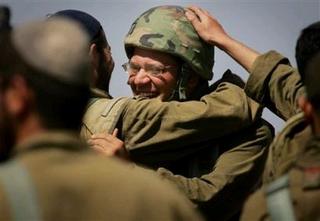 I love you more today than yesterday, but not as much as tomorrow. When we get to kill Arabs for real. Colonial ethnic cleansers celebrate firing practice rounds.
I love you more today than yesterday, but not as much as tomorrow. When we get to kill Arabs for real. Colonial ethnic cleansers celebrate firing practice rounds. Embraceable you. The boys who call the "light unto the nations" home seem to get a little turned on at the prospect of killing Arabs.
Embraceable you. The boys who call the "light unto the nations" home seem to get a little turned on at the prospect of killing Arabs.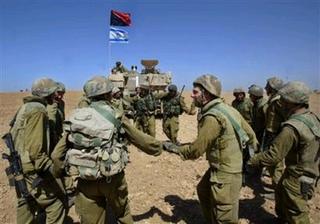 Come on baby, do the locomotion Israeli Occupation Forces having just fired test rounds dance in anticipation of killing Palestinians "by any means necessary," in the words of the venerable Arab killer, Sharon. (photo by Oded Balilty)
Come on baby, do the locomotion Israeli Occupation Forces having just fired test rounds dance in anticipation of killing Palestinians "by any means necessary," in the words of the venerable Arab killer, Sharon. (photo by Oded Balilty)Saturday, September 24, 2005
Dr. Salman Abu Sitta: Restoring Dignity 'For the Record' to Shattered Lives
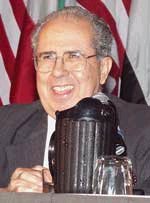
Dr. Salman Abu Sitta at the Palestine Center in Washington DC, May 27.

What a tower of humanity Dr. Salman Abu Sitta is. What a model of the nobility one may attain in a world in which wrong is lauded by craven and prostituted politicians and humane people are condemned as extremists at best and anti-Semites at worst. Dr. Abu Sitta's The Atlas of Palestine 1948 provides documentation of truth that has been sucked right out of the national discourse by a calculated, systematic, and pernicious Zionist campaign of vilification of all which is Palestinian.
Dr. Salman Abu Sitta provides the following documentation and information in his masterpiece, which he illuminated at the Palestine Center in Washington, DC on May 27.
"The Atlas . . . resurrects the original names of places erased by the Zionists starting in 1948. 'The names also restore the vocabulary of the people and the history.'
"Abu Sitta documents that in the post-World I division of the Arab world into French and British spheres of influence, 23 Palestinian villages were dissected. 'Their lives were shattered . . . the story of all this is colonialism, where the foreign poweres divide the land and the people suffer.'"
He also notes that " another 111 Palestinian villages were dissected [when the 1949 armistice line was created] . . . 'people were crying and screaming behind the U.N. and Israeli surveyors who were arbitrarily dividing the lands and villages.'"
Abu Sitta documents 70 massacres. And with what will rank beside Dr. Walid Khalidi's seminal works Before Their Diaspora and All That Remains, Dr. Abu Sitta describes the depopulation of 675 villages, detailing "when people were expelled . . . by which military operation, and why people left."
Dr. Abu Sitta shatters the Zionist lie that the havoc they wreaked on Palestinians was the result of attacking Arab armies. Perhaps now the disinformation that Arab armies attacked tiny Israel will finally go the way of the 'land without a people for a people without a land' malicious lie. " ...half of the total Palestinian refugees were created by Zionist militias while Palestine was still under British mandate and before the establishment of the Jewish state . . . it gives credence to the claim that Arab militias were responding to Zionist ethnic cleansing when they came to Palestine to save what little was left."
And take note collaborators and all those who have made a career of the "peace process." Dr. Abu Sitta says, "The Right of Return is an inalienable right." Nobody, absolutely nobody, and give this right away beyond the person themself."
Included with The Atlas " is a guide describing how refugees can find villages and other sites using modern Israeli roads. The Atlas exists 'not only to recover the names of Palestine . . . but as a blueprint for the future, when the Palestinian people will be allowed to return home.'"
The Atlas of Palestine 1948 costs $200 + shipping.
U.S. Contact the Institute for Palestine Studies at http://www.palestine-studies.org or phone (202) 342-3990
UK or Europe, contact Al Saqi Books at Alsaqibooks@aol.com or phone +011 44 20 7229 8543
All other countries contact Palestine Land Society http://www.plands.org
Thursday, September 22, 2005
'We Will Lose Our Land If We Stay Quiet'
We depend on farming olives. It is our main source of income and living. Sixty per cent of villagers are farmers that depend on selling olive oil and olives. Their future is in peril.
Five to 10% depend on herding, and since part of the land that was taken by the wall was for cattle grazing, there is no chance for them to do this anymore, so they are being forced to sell their animals. The wall is destroying our village and our livelihoods. It is destroying an entire community.
Where will the coming generations go to? They will be forced to migrate to Ram Allah or outside of Palestine. And both migrations are considered a modern and civilised form of transfer and expulsion. It is done in a discreet, seemingly unintentional way.
It's not a matter of security but of stealing land, taking as much land as possible from the West Bank and eliminating any possibility of creating a Palestinian state in the future. It is a cancer that kills any dream in Palestine.
The idea [for the demonstrations] was to send the message to Palestine, to the Israeli army and to the entire world that there is a small village called Bil'in whose very existence is at stake and who will not stay quiet about it.
Don't you ever feel you are fighting a losing battle?
We will lose much more if we stay quiet. We will lose our land, our livelihood, and our community. And history will not be merciful to us. Our children will blame us, and ask us, Where were you and what did you do to try and stop this? We cannot lose more than what we as a Palestinian people have already lost.
I see a glimmer of hope that drives me to persist and it is planted in all my colleagues and villagers and supporters.
As long as you continue to demand you rights, you will never lose them. Even if the wall is built around Bil'in, we have plans to continue our demonstrations, in the same way and same spirit.
Even though it has taken us this long, and the year is almost over and construction on the wall is almost complete, we will persevere, we will cling to this hope, and continue on the same path of non-violent resistance. Because it will be a huge accomplishment for us if the wall is removed or at least moved back.
Child Dies From Wounds Sustained Last Month

A Palestinian medical source at Al Ahli Hospital in the West Bank city of Hebron, reported that one child died of wounds sustained last month after an explosive charge fire by the army exploded sometime after impact.
The child, Fadel Khaleel Abu Arram, 14, from Yatta village near Hebron, was seriously injured in Al Mosafer area, east of Yatta village, near Hebron, on August 17, 2005
IOF Murders Teenager
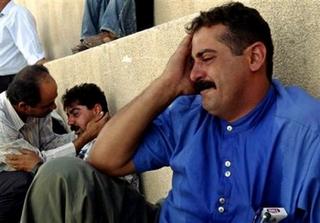
Israeli occupation forces from Mevo Dotan military installation south of Jenin killed 19 year old Ala Adnan Handooli Thursday while Jenin residents and political parties were preparing celebrations for the withdrawal of Israeli occupation forces from Kaddim and Ganim settlements.
PNN Jenin correspondent Ali Samoudi, described the scene.
“This morning Israeli occupation forces committed another new crime against the Palestinians while we were making ready to celebrate the withdrawal of the Israeli occupation forces from its last military camp in Dotan, which is near Arrabi. Israeli occupation forces, which had mostly withdrawn from the camp but partially remained inside, shot randomly at the citizens around that were spreading in the area making ready to celebrate the withdrawal. Al Handooli was hit. He’s 19 years old from Silat Athahar Village. Several shots hit him in the back and into the chest and he was killed instantly.
“They moved him to Jenin in the midst of an atmosphere of anger and rage that was expressed by organizational representatives and his family who were pushing their way to the hospital amidst great anger. The crime came when the Palestinians were celebrating the withdrawal of the Israelis. There’s a large demonstration in Silat Athahar, screaming against the occupation and to continue the resistance against the continual Israeli crimes.” Photo, Mohammed Ballas, AP
Sunday, September 18, 2005
Sharon Feted On Sabra/Shatila Anniversary

The twenty-third anniversary of the massacre in the refugee camps of Sabra and Shatila has gone virtually unnoticed by a western press too busy feting war criminal Ariel Sharon for his "courage" in returning a fraction of stolen Palestinian lands, and too busy admonishing Palestinians that peace between Israel and Palestine is basically all up to them, not bothering to mention the ongoing Israeli land thefts in the West Bank and its relentless Judaisation of Jerusalem. The western press has also taken to demonising Hamas "gunmen" at every opportunity, leaving readers clueless that Hamas is a reaction to the violence of fifty-seven years of virulent Israeli racism and ethnic cleansing.
And it looks as if Ariel Sharon will forever escape justice, of the temporal kind, anyway. Having successfully escaped justice from the Belgium Court for Sabra and Shatila, Tony Blair has promised him, according to an Israeli Army report, to take care of the matter of Israeli war criminals facing arrest and trial in the UK.
On September 16, 1982, the Lebanese Christian militia Falange, went into the Palestinian refugee camps of Sabra and Shatila near Beirut. They murdered between 800 (official Israeli figures) and 3,500, "according to the investigations of the Israeli journalist Kapeliouk," people. The Israeli army entered this part of the city the previous day. The Israeli Army, under the direction of then Defense Minister Ariel Sharon, sealed the camps, prohibiting anyone from leaving, and proceeded to observe the massacre from rooftops.
According to Musa Al-Hindi, an activist with Al-Awda (Right to Return Coalition), who was seventeen and living in Beirut at the time, "Prior to its withdrawal, Israel, who had always bragged about the IDF's 'purity of arms,' precipitated the massacre of 3000 Palestinians, Lebanese, Syrians and Egyptians in the camps of Sabrah and Shateelah. Israel has always denied responsibility for the gruesome killings of the men, women, and children of the two camps. Its soldiers might have not participated in the actual killings, but any body who is familiar with the camps and their surroundings, would have no doubt that they could see and hear the screams of the men, women and children who were being executed. After all, the blood orgy carried out by the scavengers of the right-wing Phalangists lasted for two days, and the Israelis had established posts on top of the buildings surrounding the camps."
The Israelis also supplied the bulldozers. According to Malaysia's New Straits Times
"Instead of protecting the inmates of the refugee camps, Sharon had meetings with Israeli ally Major Saad Haddad, leader of the South Lebanon Army militia, and Phalangist militiamen and politicians Elie Hobeika, Fadie Frem, Zahi Bustami, Amin and Pierre Gemayel. Israeli soldiers surrounded and sealed the camps but allowed the Haddads and the Phalangists to enter the refugee camps and go on a murder spree. Israel supplied bulldozers to demolish buildings and bury the victims in mass graves. Any refugees fleeing the massacre were turned back. From observation posts on the periphery of the camps, Israeli generals planned and observed the massacre of the inmates. At night the Israeli Defence Force fired flares to light up the sky for the murderous attacks to continue. The Lebanese militia were given food, water and ammunition throughout the massacre."
To its credit, the BBC's website reprised the BBC story from 1982. It also printed a gripping memoir from Deborah Thornton Jackson, a British citizen married to a Lebanese businessman. Jackson volunteered in the Gaza Hospital in Beirut in the wake of the massacre. Her account, like all of the accounts of the survivors and witnesses to the massacre, is harrowing and difficult to read.
"What will always stick in my memory is of a little boy that had come from the camps, and his little body had no limbs. I can remember just holding him, holding his little body close. He was covered with blood and the life was running out of him. He was crying for his mother. "
Al-Hindi recalls going in the southern entrance of the camp and wishing that he had not.
"What I saw will continue to haunt me for the rest of my life. I saw a middle-aged woman hysterically dancing over a pile of children's bodies, pulling her own hair and scratching her face, and singing unintelligibly. I tried to make some sense of her words. The only phrase I could hear was 'ya mshaharah ya Subhiyeh [what a hellish, unbelievable sight, oh Subhiyeh].' The rest were just unintelligible sounds. A sobbing man, either her husband or brother, I assumed, was trying to make her stop, but without any success. I can still remember her dark, wrinkled and bleeding face, her gray hair and the Hennah on her chin. Next to the pile kneeled a younger woman, with her face buried in the sand. Suddenly she stood up and started to tear the top of her dress, only to be stopped by other women in the crowd."
As long as the media continues in its one-sided coverage of Middle East it is culpable in the ongoing horrors perpetuated by the US and Israel in the region. BBC was the only mainstream western news outlet to show up on a google and yahoo news search for Sabra/Shatila. Few in the western world know that suicide bombings are a reaction to the horrors of a racism that welcomes anyone with a Jewish grandparent to Israel, but will prohibit any Palestinian in exile from going home. Issa Hamoud, a refugee in Lebanon told CNN five years ago, "Any Palestinian who tells you that he doesn't want to return to the homeland is lying. Any one who resides outside their home lives in humiliation. Just look at what happened to our people right here."
Anne Annab, housewife, the Cindy Sheehan of Palestinian activists in the US, writes letters on behalf of justice for the Palestinians to the western media every day. Annie wrote the following to the Baltimore Sun regarding its Zionist propaganda story, "Hamas Gunmen March Through Gaza Settlements."
"Thanks to the racist nature of political Zionism, Palestinians are veritable prisoners, persecuted and impoverished no matter what they do or say, and demonized as if they hold all the power and a huge arsenal. Israel stands in long term and flagrant violations of international law and the Palestinians' basic human rights- and yet Sharon is welcomed at the UN and given a podium to promote his bible stories so that American Zionists will continue to eagerly arm and empower Israeli racism.
"But rather than respecting the Palestinian refugees' inalienable right of return, generously subsidized Israeli soldiers and settlers continue to harass and harm vulnerable Palestinian men, women, and children. Generously subsidized Zionists continue to steal Palestinians' land and rights, continue to invest in injustice and bigotry, continue to build concrete walls of hate. That is what should be noticed and headlined."
(photo http://www.bintjbeil.com/A/news/images/010801_sabra_shatila.jpg)
Saturday, September 17, 2005
Tragedy in Taybeh Was No Pogrom
Ramallah was settled because of a "dispute over a girl." Rashed Haddad lived with his brothers in the area of Karak and Shoubek, east of the Jordan River. They were surrounded by a powerful Arab tribe headed by Emir Ibn Kaysoom. Ibn Kaysoom was visiting in Sabra Haddad's home when a girl was born to Sabra, Rashed's brother. At that time Ibn Kaysoom requested the girl as a wife for his son. To be polite, Sabra agreed, not taking Ibn Kaysoom seriously, since intermarriage did not occur between Muslims and Christians.
The girl grew up and Ibn Kaysoom's people requested her for his son. Sabra, dumbfounded by this request, refused. A fight broke out between the two tribes and two of Sabra's sons were killed. Ibn Kaysoom threatened to kill the rest of Sabra's family and take the girl.
Later, in order to trick Ibn Kaysoom to get revenge, Sabra set a date for the wedding. A feast was prepared. When it was time to eat, Sabra and his relatives drew their swords and killed all the males, including Ibn Kaysoom's son. Then Sabra, Rashed, and the rest of the brothers went across the Dead Sea into Palestine winding up in Ramallah after sojourns in Halhoul, Hebron, and Beit Jala. Eventually, Sabra and Ibn Kaysoom reconciled and Sabra returned to Karak.
The Zionists, of course, quickly tried to make the most of the incident in Taybeh. Daniel Pipes took the opportunity to launch his predictable invective against Muslims and David Horowitz's odious FrontPage magazine was close on his heels. Westerners, who know little about Christian and Muslim relationships, favored headlines informing that a "pogrom," was launched by Muslims against Christians.
This incident must be viewed in perspective as a family feud even though Zionist propagandists and their Arab lackeys are working overtime to use it to denigrate Muslims by inventing Muslim "pogroms" against Christians. Raja Matar writes brilliantly in "Arab Christians Are Arabs,"
"Pogroms were an invention of Christian rulers in Europe, mostly directed against Jews - for which Palestinian Arabs, both Christian and Muslim, have been paying dearly as the Christian West tries to atone for its sins at their expense. This Western guilt complex, nurtured continuously by Zionist propaganda, has resulted in a tomblike silence over the atrocities perpetrated by Israel over the past 60 years."
Father Raed Abu Sahliyeh of the Christian village of Taybeh says,
"I reject the newspapers and the people who spoke about an attack by Muslims against Christians. I will repeat this a million times: We are Arabs, we are Palestinians and we are Christian since 2,000 years. This is a small biblical village. We have lived in peace with surrounding Muslim villages for 14 centuries."
Matar elaborates, "We Arab Christians should avoid at all costs to forge alliances with any new crusaders against Arabs or Islam. We should support the Arab's struggle today against these neo-crusaders who are masquerading as liberators and democracy promoters, and who are trying to disfigure Arab history and reshape Arab Culture and values. "
Just as Ibn Kaysoom and Sabra Haddad reconciled in spite of their tragedy the wise heads of Taybeh and Deir Jarir know better than to be used as pawns of the enemy. In fact it was Saladin who named Taybeh, "tabeen," for "kind" for when the Muslim warrior went through the town, he was taken by the hospitality and friendliness of its inhabitants.
Let's look to the people of the two neighboring villages for the wisdom that they offer in the wake of this tragedy. Father Raed says, "This mistake between two people should not poison the relations between Muslims and Christians. Those who are playing this dirty game should calm down. We are wise and we say that we have no choice but to live together, side by side, and with friendly relations."
Abu Rashid of Deir Jarir says, "In Palestinian tradition when you make a mistake like this, you pay with your blood. It doesn't mean we're not brothers. The people of Taybeh and the people of Deir Jarir are one family. "
Bigamy Bigger Story than Bil'in

Google and Yahoo news search show that Bil'in's regular non-violent Friday protest was covered by Ha'aretz, International Middle East Media Center, and Palestine News Agency. And that's it except for a couple pictures posted on the Yahoo Middle East Slide Show by Reuters. A much bigger story is the "looting" of the much heralded greenhouses but according to Haaretz the illegal colonies were ransacked and looted bigtime before the Palestinians had access to them. And Laila El-Haddad reported on August 30 in Raising Yousuf, "Abdullah Maani told me, 'Nearly all the settlers are back - even the settlement leader. They seem to be dismantling their greenhouses.'"
And then there is the really important story of a bigamous Gaza man who rekindled his romance with his "other" wife in Egypt.
But please know, any US citizens who bequeath six billion of your tax dollars to the "light unto the nations" that on September 16 in Bil'in, "Pianist Jacob Allegro Wegloop, a holocaust survivor, and David Rovics, an American folksinger, sang for the Palestinian children, the refugees, the Palestinian cause and children . . . .
"Abdullah Abu Rahma, head of the Public Committee Against the Wall, reported that two internationals and the coordinator of the committee, Mohammad Al Khatty, were arrested."
ISM reported to the Palestine News Agency "IOF entered into several homes in retribution for the strong non-violent resistance within the village. Four jeeps swept into the village just before the morning." As usual, the IOF employed their always at the ready rubber bullets and threw gas cannisters, wounding eight people, including three kids who suffered from gas inhalation.
Wednesday, September 14, 2005
Killing Us Not So Softly, But Slowly
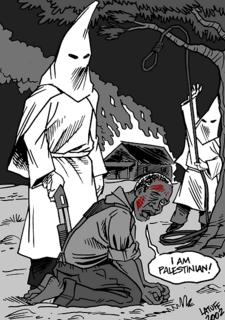
Khaled Almayreh makes several points in his story about a meeting between Palestinian women and a delegation from Women in Black, comprised mainly of Italian women. Next time a Zionist apologist cites "suicide" bombing as a justification for collective punishment think about Shara Abu Sharar's words.
"Abu Sharar said her husband, Salim Safi, died of torture at the hands of Israelis inside a torture cell on 6 January 1971. 'There were no suicide bombings then, there was no intifada. Yet, they killed my husband and tormented my family and me personally for many years to come.'"
Ever wonder why nine thousand Palestinians are behind bars and upwards of one quarter of Palestinian men have been detained by the occupiers? Perhaps the same reason the US detains Iraqis, ninety-nine percent of whom according to Ali Shalal al-Qaysi, the hooded Christlike Iraqi prisoner, are innocent.
When asked by the Italian newspaper La Repubblica why he was interrogated he replied, “They wanted to know if I was fighting against the occupation. But also if I knew people in the area in which I lived: I had the impression that they were searching for someone who would become a collaborator, they wanted information. They wanted me to become “their eyes” in the region. But I didn’t know anything, and I did not respond to the questions. In that way, they began the torture. They always asked me the same things, they repeated them dozens of times, I think it was a strategy to make me talk. The interrogations were conducted by persons who said to have worked in Gaza and in the West Bank.”
Amayreh reports "Dua'a Takruri, 21, who spoke in English, described the 'slow death' being meted out to more than 9000 Palestinian prisoners in Israeli jails, including her father, Haroun Takruri, who has been behind bars for 20 years for resisting the Israeli occupation.
More than 9000 Palestinians are imprisoned in Israeli jails. 'When I visit my dad, I see him only through double glass. They don't allow any physical contacts. They treat us like animals, and after five minutes, they tell us time is up.' "
Sarah Karajeh, president of the local Palestinian women's union, "whose husband was killed by undercover Israeli soldiers three years ago . . . described the Israeli occupation as 'an act of rape', [and] called on women around the world to stand up for justice and not be 'deceived by the negative stereotypical images about our people and our cause. We don't have the means to defend ourselves. And I don't reveal a secret when I say that we essentially rely on the world public opinion, people like you, for our survival. So don't let us down.'"
But we're letting Palestinians down if one looks at statistics compiled for just one week.
"The National Information Center, which monitors the Israeli violations in the occupied territories, reported that Israeli soldiers shot and killed three residents, injured 14, and arrested 68 in the period between September 6 and September 12, 2005. The center also recorded 601 violations during this period.
"Israeli soldiers arrested 68 residents in 55 invasions carried out in the Palestinian territories; soldiers broke in 174 homes and institutions, installed 55 roadblocks, and closed roads and crossings 130 times, the center reported. "
Sounds as if 'slow death' is being meted out by the 'light unto the nations' indiscriminately, and not just to those behind bars.
In the Path of the Wall
Bil'in, site of non-violent Palestinian, International, and Israeli resistance every Friday.
Last week, Israel's Occupation Forces put Bil'in under curfew at 5:00 AM Thursday morning; however many Palestinians broke the curfew and were arrested. Bil'in. Got That CNN, MSNBC, CBS, ABC, FOX, NBC?
Arab Christians are Arabs
Needless to say, many Arabs are dissatisfied with the current state of Arab affairs. Things do look frustrating, depressing and seemingly hopeless. During such periods of national malaise, there is a tendency among some intellectuals to deny even belonging to their own Culture and to find an outlet in esoteric ideas and fanatic ideologies. That is one of many reasons why Communism took over Russia, Nazism took over Germany and radical Islamism is now holding itself as an alternative to secular Arabism. But the current torpor in our political landscape is no reason to create an imagined identity for ourselves from the ruins of defunct civilizations. Nor is it sufficient justification to distance ourselves from our Arab Culture and attach ourselves to a technologically and militarily superior West, whose past and present morality - massacres, wars, religious pogroms, colonialism, and ethnic cleansings, up to and including Abu Ghraib, Guantanamo, Bagram and the unconditional support of Israel's genocidal policies - are hardly occasion for great pride
There are many agitators who have a political agenda and are keen to distort history and statistics to fit such an agenda, imagining ethnic differences where none exist. They are either alien to this Culture - or have alienated themselves from it - and are trying to fabricate falsehoods and pass them on as history to uninformed listeners or readers. They are trying to invent for Arab Christians an artificial identity antagonistic to the environment they have always been part of, not realizing - or maybe they are - that by nurturing such a rift they might be creating among Arab Christians an anti-Islamic 'fifth column', disloyal to its own Culture and probably imperilling whole Christian communities in the Arab Middle East. And for what? To toady to Israel and its patrons in the U.S.?
Tuesday, September 13, 2005
'Because We Are Palestinians'
Jerry Levin - CPT Sept 9, 2005
The following is edited from Christian Peacekeeping Team's Jerry Levin's From the Inside Looking Out. Jerry was the Beirut Bureau Chief for CNN in 1984 when he was taken as hostage. His wife, Sis, non-violently negotiated for his release. Sis and Jerry have both been active in the West Bank for many years.
(Hebron, West Bank, Palestine September 9, 2005) The start of the new school year in Hebron has been marked by settler harassment and violently erratic police and army behavior. Even before school began, settlers launched the new season by picking up where they left off last spring: this time menacing Qurtuba Girls School teachers warily trying to get ready for opening day. The teachers (four of whom are pregnant) were obliged to endure a gauntlet of stone throwing, egg pelting, jeering sneering ultra orthodox ultra nationalist hatred-obsessed men and women, and their hatred fear indoctrinated children.
The new large economy size electronic metal detecting prefabricated mobile "caravans" craned into place late last week just in time for the start of school has quickly become the focus of new school related tension and protest. The street has long been ruled off limits to all Palestinians except those living along it. The other caravan is at a brand new barrier set up near the Ibrahimi Mosque. Its purpose is to block unmonitored access to two schools near the Ibrahimi Mosque: Al-Fayhaa Girls School and the Ibrahimi Boys School.
Qurtuba Girls School teachers and students have a long and fretful history of accessing the Dubboya Street checkpoint each day. However, because of the women's years of experience learning how and trying to minimize its harassing and humiliating effects, they were able to avoid, at least for now, the potential delays connected with the new screening procedure.
The first day of school, the teachers feeling terribly threatened, by prearrangement, assembled with their pupils outside the caravan. According to one of the Palestinian women who was there: The soldier on duty was told that the women and girls would not "go through the cabin…..because it is damaging to pregnant women."
"Who is pregnant?" the soldier on duty wanted to know.
Then a spokeswoman pointing to the entire group said, "We all are."
The surprised soldier asked, "Why?"
"Because," the spokeswoman replied, "we are Palestinian." A plastic barrier adjacent to the caravan was removed and all the women and girls were allowed to slip quickly around the caravan.
That is what happened a mile to the south at the new checkpoint. The news of what the teachers in Tel Rumeida had accomplished reached the teachers at Al-Fayhaa Girls School who now were being confronted with the new experience of regularly traversing a sophisticated checkpoint that hadn't been there before. It took four days of mounting anxiety over having to submit to electronic screening that they were galvanized into organizing their own campaign of avoidance.
Gathering outside the security caravan a teacher spokeswoman, aided by a TIPH interpreter (Temporary International Presence Hebron), asked the soldier on duty to open a path through an adjacent plastic barricade so that everyone could pass through at once rather than singly and slowly.
The worrisome electronic security device, it was explained "can see into us." After checking with his commander by phone, the soldier said, "Yes," but added that each day a teacher would have to ask for permission to do that all over again.
The next morning, contrary to expectations . . . soldiers at the caravan told the once again assembled teachers and girls and interested International that unlike the day before the commanding officer, anticipating the request, had already ordered all women and girls to follow the new screening procedure. Despite attempts by CPTers John Lynes and me to get the soldiers to allow the teachers and their students to circumvent the electronic sensing devices again, the soldiers adamantly refused.
Feeling dejected for a time by the turn down, all of us were surprised when suddenly and unaccountably one of the soldiers allowed the girls to pass around the caravan though a plastic barricade…but not the teachers. The spurned teachers stood close by refusing to move. By this time, however, seven men teachers from Ibrahimi Boys School in solidarity with their eleven female colleagues also refused to be examined electronically and waited along side the women for the soldiers to give in and give way.
At about 8:30 the hundred or so Al-Fayhaa students suddenly and surprisingly reappeared unbidden by the teachers from around a corner and swarmed back to the barricade to loyally dramatize their support for their adult mentors and role models. After a few minutes the surprised teachers persuaded their charges to go back to school. Which they did; but a half hour later they popped up again: this time quite mysteriously on the other side of the barricade alongside their once again astonished teachers. Again the teachers told the girls that their place was in school. So their second adventure also terminated, the chattering girls gaily trooped back via the mysterious route which had allowed them to elude the checkpoint entirely.
Finally a few minutes before 10:00 a compromise was reached. The women allowed a soldier with a metal detecting wand to wave it over them one by one but in the street – not inside the caravan. Then they were permitted once again to file through the barricade. The men however refused saying that they would rather conduct school in the street than submit to the inconvenient and humiliating checks. In addition to having to pass muster with the sensor, they complained, they often have to empty their pockets and more often than not take off their belts.
Meanwhile, border police at Gate Six leading from the Old City to Ibrahimi Mosque, have been persistently detaining the principal and teachers at the boys school as well as senior high school students: making them all late to their jobs and classroom studies. The very first day of school one of those senior boys on his way home was not only detained but beaten. And he has been similarly detained almost every day since then but not beaten: due perhaps to the watchful presence of CPT and other international monitors.
'We can finally . . . play without anyone shooting at us'
"We can finally move freely throughout Gaza and play without anyone shooting at us," said 14-year-old Abdullah Yunis, as he surveyed the remains of an Israeli sniper tower that overlooked his refugee camp.
Monday, September 12, 2005
Israelis' "Blazing Synagogues" Fire Up Press Brigade
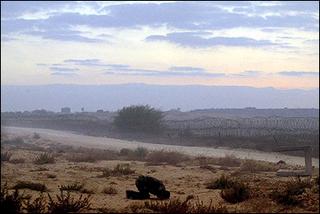
Predictably, the mainstream press featured screaming headlines of "blazing" synagogues set by rabid Pals: "Synagogues burned as Israel Exits Gaza," appeared as a head on Yahoo's Main News Page, while this lead appeared from Reuters: "Jubilant Palestinians planted flags on the rubble of Jewish settlements and set synagogues ablaze on Monday as Israeli troops pulled out of the Gaza Strip after 38 years of occupation." What a stroke of brilliance to leave the empty synagogues behind. It should be all too obvious to anyone with at least half of his/her functioning brain cells that the Zionists calculated a few "blazing synagogues" would result in groovy press for the retreating Israelis and the usual dehumanisation of the Pals. The western press never disappoints.
Unfortunately, one Palestinian was killed. And Palestine Center for Human Rights, Gaza, reports that six drowned at a Khan Yunis Beach.
Laila El-Haddad writes in Raising Yousuf that EU and PA officials reported "everything has been destroyed [by colonists], uprooted, ripped out, or looted."
She writes further, "Sabri Saidam, Minister of Telecommunications, compared it to the Katrina disaster zone."
There is more. "An European official I spoke with said even the greenhouses-for which the settlers were PAID something like $40 million to keep, were dismantled-only the tarp and wire was kept in tact, everything IN the greenhouses was destroyed or taken back.
" He told me some settlers came back in and offered to 're-sell' the machinery that kept the greenhouses going.Everything was taken out, even light sockets. Trees were uprooted, electricity lines were cut, and vegetation was not watered for 15 days leaving a 'scorched earth.' The official also told me how he saw so-called sewage treatment facilities: 'basically it was one big septic tank-the sewage was dumped onto gaza dunes, and filtered into the Coastal aquifer.'"
Imagine that. I guess that The Los Angeles Times must have been too busy checking out the blazing synagogues that no longer had their religious artifacts in them to bother to include some concrete details about the colonists' shenanigans. Their headline: "Gazans Burn Synagogues in Israelis' Soldiers Wake."
The AP's Ravi Nessman and Miriam Fam exert a bit of patience and wait until the second paragraph to wax about the blazing synagogues. In the ninth and tenth paragraphs they get around to the dead Palestinians. No matter, though; this is the way of the world as Hurricane Katrina so baldly shows; people are expendable, property is paramount.
As Israeli "disengages" the corporate press engages in its business as usual, offering little insight, serving up the usual dehumanised Palestinians, and ignoring the fact that Gaza remains a prison that no one may enter or leave without extreme difficulty. (photo by Awad Awad, AFP)
Saturday, September 10, 2005
Internet Use High Among Palestinians
Desert Bloomers Tutor Bil'in Pals on Democracy
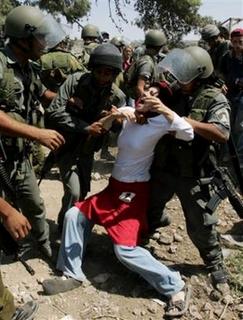
At 5:00 AM Thursday Israeli Occupation Forces, the desert bloomers, entered Bil'in, the town where peaceful protests against the apartheid wall occur each Friday (except for the time the IOF planted stone throwers in with the protesters, which gave them an excuse, as if they ever need one, to shoot), and announced a curfew.
This is what the only democracy in the Middle East did to the courageous curfew breakers according to International Solidarity Movement:
"Mohammed Al Khateb, a coordinator with the Bil'in Popular Committee Against the Wall, was beaten by soldiers and has suffered some injuries. Two other Palestinians also have been injured. One man has a rubber bullet lodged in his leg and another suffered injury by shrapnel from a sound grenade."
WAFA reports the following:
The number of activists wounded and arrested in Bil'in village has rapidly mounted due to the Israeli soldiers' violence against them.Member of the Popular Committee against the Apartheid Wall in the village said the number of the activists arrested by IOF has mounted to 52, most of them Israelis and internationals. He added at least 40 were wounded, including two journalists and three children.He added that the head of the Popular Committee against the Apartheid Wall in Bil'in Abdullah Abu Rahma was arrested.Witnesses said IOF assaulted the team of the Egyptian TV with a tear gas canister, wounding the TV Reporter Muna Hawwash and the cameraman Islam Hamad.
George Bush, Israel's benefactor, and Israel aka "light unto the nations," and "only democracy in the Middle East," continue to make remarkable progress bringing democracy to the Middle East.
Photo by Nasser Nasser, AP. Israelis arrest an international at Bil'in on September 9. Democracy means acquiescing to Jewish supremacy.
More Dying in the Dark for Palestinians

Basheer Soufi, 20 was killed Thursday by Israeli Occupation Forces. "Dr. Moawiya Hassanen, head of the Emergency Unit at the Ministry of Health, said that Soufi was shot in his head, causing instant death."
His death went unnoticed in the western press, no surprise there.
Israel's Occupation Forces also shot at a couple of twelve year old kids on Wednesday.
"Earlier on Wednesday, Israeli soldiers shot and injured two Palestinian children in Rafah, while they were playing near Salah Ed-Deen Street, in Rafah, One of the injured children was identified as Ahmad Qishta, 12 years old."
"A Palestinian young man was shot dead Tuesday evening by Israeli soldiers west of the southern Gaza Strip town of Khan Younis, Palestinian medics and witnesses said.
Nemmer al-Sadooni, 22, was killed and three others wounded, one in serious condition, said medics at Nasser Hospital in the town," was reported in the People's Daily Online.
Yahoo News featured a story headlined "Israel Destroys Military Facilities" on its main page Friday, September 9. Neither of the deaths got a mention even in the last paragraphs. Since the AP's Amy Teibel was the author it's no wonder. Teibel is one of the minions of journalists who have, to borrow Al-Jazeera's Laila El-Haddad's phrase, succumbed to the "weepy" settler syndrome. Not to draw undue attention to Teibel, hundreds of stories appearing today about Israel's military departure from Gaza do not mention the two pointless deaths.
What is a wonder is that journalists, in spite of some of their laudable performances covering the victims of Hurricane Katrina, don't point out that the Israeli Occupation Forces managed to contain themselves when acid was thrown on them by Jews, but think nothing of targeting Palestinian youth through the head and heart.
Meanwhile the Butcher of Beirut will be feted at the UN on September 15. Business as usual for the war criminals of the world.
photo by Roberto Schmidt, AFP, Bashir's 10-year-old brother in background
Wednesday, September 07, 2005
IOF Guns Down Unarmed Epileptic in Courtyard
Of course, it's worse, beyond belief, as Israeli outrages against the indigenous people tend to be. Just when one thinks it couldn't be more heart wrenching, the Israelis never disappoint. Their cruelty and utter disregard for Palestinians, whether it be forced removal of clothes at checkpoints, humiliation of elders in front of their children, or targets for their insatiable desire for Palestinian kills, mocks civility. And these disciples of racial supremacy will continue to give the bird to decency because their depravities go unreported in the US media. Each and every Israeli outrage falls under the catch all obscenity, "Israel has the right to defend itself."
This is who the goons killed according to International Middle East Media Center: Anas Abu Zreina worked in a vegetable market, a high school kid, who had never been involved in any type of resistance activity.
This is what the goons said after the kill which they confirmed with a bullet to the head, and which has been disproven by Israel's own human rights organization: "Anas Abu Zreina "is an accessory to wanted fighters."
This is what Anas' schoolmate in the godforsaken courtyard said: "Anas had brought invitations to his brothers wedding, which was two days later, and everyone was in a good mood and eating sunflower seeds."
The death squad (oh, the media feigned such ignorance when another death squad that they presented as two good ol' Israeli boys who'd lost their way, was lynched in Ramallah at the beginning of the Intifadeh) said, "Stop," and "Don't Move," and then proceeded to shoot the unarmed boys and men in that up close and personal close range way that they've perfected. Then they "confirm" the kills. How tidy. Like proofreading a paper before one turns it in.
And, surprise, surprise. The Israeli army change their bogus stories.
First they said that "Five [terrorists] responsible for the attacks at the Sage club and Hasharon Mall in Netanya were killed in Tulkarem."
But sometime after the slaughter in the courtyard of the unarmed boys and men the fighting men of the light unto the nations "are not sure of the level of wantedness" of the men. Seems as if Ateeya Abu Khalil's family may have "supported" Fatah, as do "half the families in Tulkarem."
"Abu Khalil was active with the Islamic Jihad (God forbid that a young man should resist occupation by a brutal army; what type of man does not?), but he turned himself in to the Palestinian Authority after stopping his activities and used to sleep at police stations for protection. The Islamic Jihad movement confirmed that he left the organization before he was killed by the army."
And poor Mahmud Ehdieb with his "nasty," "brutish," and "short" term on this earth. He joins Johnny Thalijjieh, altar boy (just when you thought they were all 'terrorists'), the old retarded bell ringer for the Church of the Nativity, the young drummer for Ramadan . . . victims of an occupation Palestinians should just shut up about. According to his dad, Mahmud " had been wearing a diaper recently because he was incontinent." He was also an epileptic. Just better bet that the army that prides itself on"purity of arms" confirmed the kill on that hapless kid.
Distribution of population by subdistrict, with percentages of Jews and Palestinians, 1946
According to British sources, the semi-sedentary Bedouin population of the Negev was ca. 100,000 in 1946. As excerpted from Khalidi, Walid. Before Their Diaspora: A Photographic History of the Palestinians, 1876-1948. Washington DC: Institute of Palestine Studies, 1992, p. 239.
Acre Palestinian 96 percent Jewish 4 percent
Safed Palestinian 87 percent Jewish 13 percent
Haifa Palestinian 53 percent Jewish 47 percent
Nazareth Palestinian 84 percent Jewish 16 percent
Tiberias Palestinian 67 percent Jewish 33 percent
Jenin Palestinian 100 percent
Tulkarm Palestinian 83 percent Jewish 17 percent
Nablus Palestinian 100 percent
Jaffa Palestinian 71 percent Jewish 29 percent
Ramallah Palestinian 100 percent
Ramleh Palestinian 78 percent Jewish 22 percent
Jerusalem Palestinian 62 percent Jewish 38 percent
Gaza Palestinian 98 percent Jewish 2 percent
Hebron Palestinian 99 percent Jewish less than 1 percent
Beersheba Palestinian 99 percent Jewish less than 1 percent
Zionist and Palestinian Land Ownership, 1945
The category of 'public ownership' under the British Mandate derived from that known as miri under the Ottoman system of land tenure. Subsumed under the latter category, however, in addition to state domain, were many other subcategories that admitted a whole range of private and communal usufruct and leasehold.
Zionist and Palestinian landownership in percentages by subdistrict, 1945
Acre: Palestinian 87 percent Zionists 3 percent Public & Other 10 percent
Safed Palestinian 68 percent Zionist 18 percent Public & Other 14 percent
Haifa Palestinian 42 percent Zionist 35 percent Public & Other 23 percent
Nazareth Palestinian 52 percent Zionist 28 percent Public & Other 20 percent
Tiberias Palestinian 51 percent Zionist 38 percent Public & Other 11 percent
Jenin Palestinian 84 percent Zionist Less than 1 percent Public & other 16 percent
Beisan Palestinian 44 percent Zionist 34 percent Public & Other 22 percent
Tulkarm Palestinian 78 percent Zionist 17 percent Public & other 5 percent
Nablus Palestinian 87 percent Zionist 1 percent Public & Other 16 percent
Jaffa Palestinian 47 percent Zionist 39 percent Public & Other 14 percent
Ramleh Palestinian 77 percent Zionist 14 percent Public & Other 19 percent
Ramallah Palestinian 99 percent Zionist less than 1 percent Public & Other 1 percent
Jerusalem Palestinian 84 percent Zionist 2 percent Pub & Other 14 percent
Gaza Palestinian 75 percent Zionist 4 percent Public & Other 21 percent
Hebron Palestinian 96 percent Zionist less than 1 percent public & Other 4 percent
Beersheba Palestinian 15 percent Zionist less than 1 percent Public & Other 85 percent
